
Jerk Manager Ruins People’s Beloved Game Store, Ends Up Being Exposed And Fired
Whether it’s an old photo or a shabby toy, we cherish our childhood memories. So when Reddit user WhiteOnmyoji learned that a ‘manager from hell’ was ruining the game shop where he spent his younger days, he decided to take action.
The opportunity presented itself when the sneaky guy was asked to come to the store as a judge for one of their events. Knowing the manager’s weakness for other people’s stuff, WhiteOnmyoji devised the perfect revenge scheme. He used the jerk’s greed against him and caught him right in the act of stealing. In front of his boss. But it wasn’t easy. The plan required sly correspondence, dominating cheeky conversations, and a whole lot of determination. However, WhiteOnmyoji executed it to a T and everything ended in the best possible way. The manager got fired. Grab some popcorn, folks, this one is going to be a long one. But it’s worth the read.
Image credits: Games for Change (not the actual photo)
According to Peg Streep, who is recognized as a research-based science writer, revenge isn’t that common. “For most of us, acting vengefully never gets past the fantasy stage; our rational minds kick in, along with our moral compasses, and perhaps our fear of continued reprisal,” she wrote for Psychology Today. “While we still may be angry, we choose instead to move on with our lives, either in full stride or with a noticeable limp.”
The author pointed out that revenge as a response to injustice has a long literary history. “Whether it’s Odysseus slaughtering the suitors who’ve taken over his house or the Old Testament intoning, ‘An eye for an eye, a tooth for a tooth,’ the theme of revenge has never lost its luster, as countless contemporary variations in movies and books from high-brow to low attest.” Indeed, from Hamlet to The Count of Monte Cristo to Gone Girl and beyond, the overwhelming energy of revenge keeps us mesmerized.
However, is there an upside to it? Kevin M. Carlsmith, Timothy D. Wilson, and Daniel T. Gilbert don’t think so. They agreed that people tend to believe that retribution of some kind effectively releases the tension and anger someone feels toward the transgressor and his action. In their own studies, however, the researchers learned the very opposite. It wasn’t just that punishing the transgressor didn’t provide a release for the participants, it actually made them focus on both the transgressor and the transgression more. Apparently, those who do not punish might move on and think less about the offender faster. So if you think you can avoid taking vengeance on someone, at least try. Otherwise, go ahead. It might make one hell of a story.
People thought the manager got what he deserved
52Kviews
Share on FacebookThis wasn't revenge, it was a very well planned sting which did exactly what it was supposed to do: revealed the criminal and his crimes, and allowed the manager to punish him correctly by firing him.
This sounds totally passive aggressive..if the owner was cool..then why not man up and talk with him about this manager. Thieft is thieft...most small shops rely on their regulars
You didn't read it then. He DID tell the owner - as it was happening.
Load More Replies...Have a very similar hobby shop like that in Etown, very tiny and cramped, but loved greatly nonetheless. Moved to a larger location, by then my children were grown. Hope they are still the same and still doing well.
It's places like these that always will do better than the large box stores because they do something different. I work a large box retailer and always happy to send people places that I know have an item; think of The Miracle on 32nd St. I think is the movie. Correct me if I'm wrong. People and the newest generation of shoppers know they can always go somewhere else without shouting and raising a stink. That's what I like and how I treat my customers/ clients, like family. I applaud the writer in helping keep this tradition going strong and helping the new owner.
I don't think that counts as revenge. As a thief, that manager set himself up for consequences. If it took one disgusted person to set up a plan to expose him, then that's all it took. It made me glad, because often justice isn't achieved so easily.
Most of these stories I've read on Bored Pand I've already read on Reddit. Basically, you can go on reddit and read most of the stories first before coming here. I still come here anyway because every now and then there's something new I've not read yet.
Nope, it was perfect. He showed the owner up front that his manager was a thief. Many people don't like to do hiring & will keep bad employees on far too long and lose good customers & other good employees just to keep from having to be a "boss." Are you the "manager" in question?
Load More Replies...This wasn't revenge, it was a very well planned sting which did exactly what it was supposed to do: revealed the criminal and his crimes, and allowed the manager to punish him correctly by firing him.
This sounds totally passive aggressive..if the owner was cool..then why not man up and talk with him about this manager. Thieft is thieft...most small shops rely on their regulars
You didn't read it then. He DID tell the owner - as it was happening.
Load More Replies...Have a very similar hobby shop like that in Etown, very tiny and cramped, but loved greatly nonetheless. Moved to a larger location, by then my children were grown. Hope they are still the same and still doing well.
It's places like these that always will do better than the large box stores because they do something different. I work a large box retailer and always happy to send people places that I know have an item; think of The Miracle on 32nd St. I think is the movie. Correct me if I'm wrong. People and the newest generation of shoppers know they can always go somewhere else without shouting and raising a stink. That's what I like and how I treat my customers/ clients, like family. I applaud the writer in helping keep this tradition going strong and helping the new owner.
I don't think that counts as revenge. As a thief, that manager set himself up for consequences. If it took one disgusted person to set up a plan to expose him, then that's all it took. It made me glad, because often justice isn't achieved so easily.
Most of these stories I've read on Bored Pand I've already read on Reddit. Basically, you can go on reddit and read most of the stories first before coming here. I still come here anyway because every now and then there's something new I've not read yet.
Nope, it was perfect. He showed the owner up front that his manager was a thief. Many people don't like to do hiring & will keep bad employees on far too long and lose good customers & other good employees just to keep from having to be a "boss." Are you the "manager" in question?
Load More Replies...









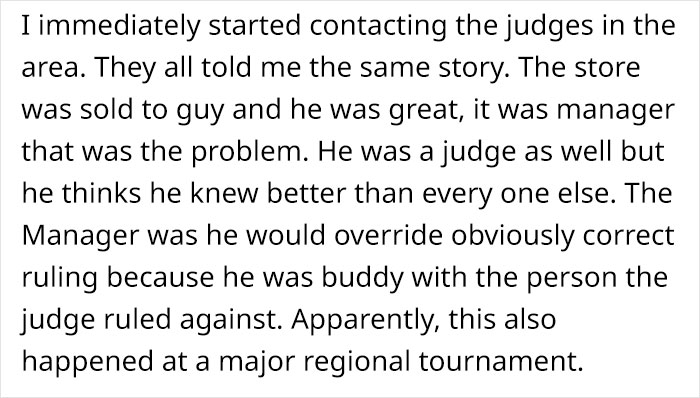
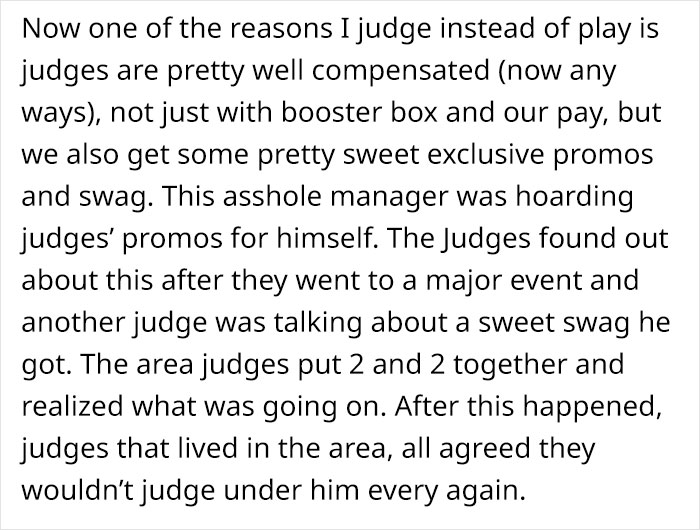





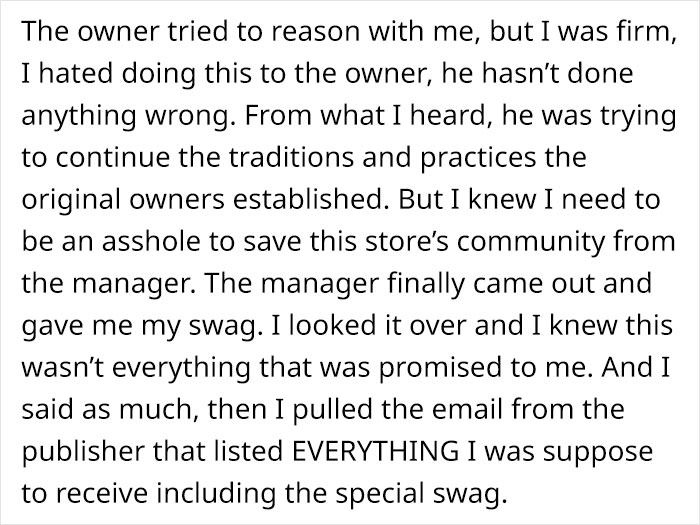


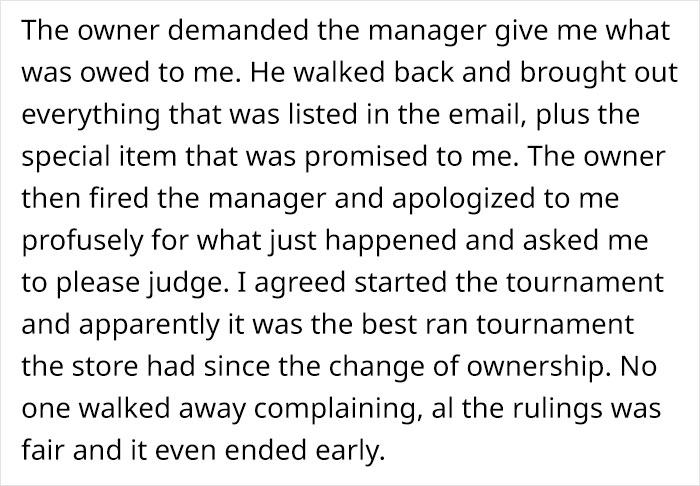
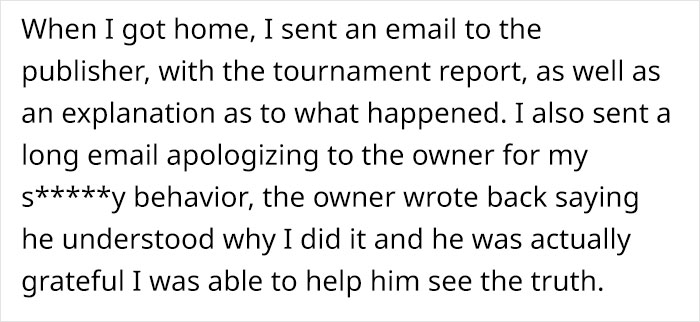




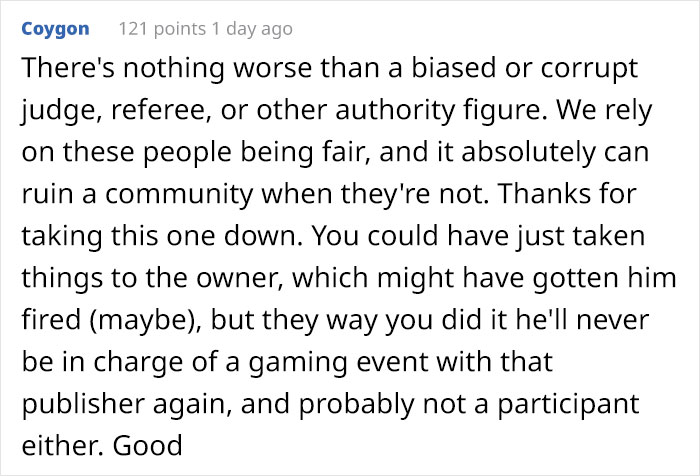

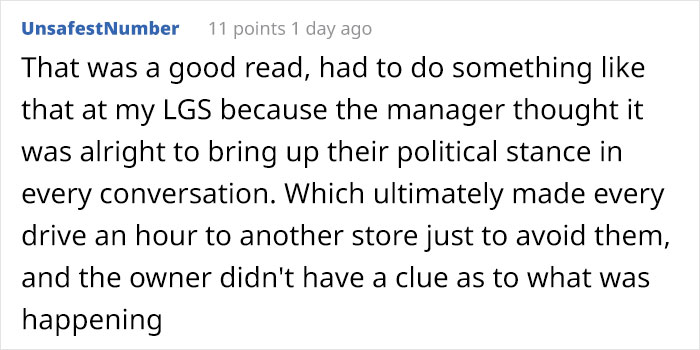





143
37